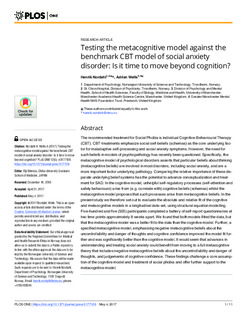| dc.contributor.author | Nordahl, Henrik | |
| dc.contributor.author | Wells, Adrian | |
| dc.date.accessioned | 2017-05-22T07:32:57Z | |
| dc.date.available | 2017-05-22T07:32:57Z | |
| dc.date.created | 2017-05-05T11:23:28Z | |
| dc.date.issued | 2017 | |
| dc.identifier.issn | 1932-6203 | |
| dc.identifier.uri | http://hdl.handle.net/11250/2443050 | |
| dc.description.abstract | The recommended treatment for Social Phobia is individual Cognitive-Behavioural Therapy (CBT). CBT-treatments emphasize social self-beliefs (schemas) as the core underlying factor for maladaptive self-processing and social anxiety symptoms. However, the need for such beliefs in models of psychopathology has recently been questioned. Specifically, the metacognitive model of psychological disorders asserts that particular beliefs about thinking (metacognitive beliefs) are involved in most disorders, including social anxiety, and are a more important factor underlying pathology. Comparing the relative importance of these disparate underlying belief systems has the potential to advance conceptualization and treatment for SAD. In the cognitive model, unhelpful self-regulatory processes (self-attention and safety behaviours) arise from (e.g. correlate with) cognitive beliefs (schemas) whilst the metacognitive model proposes that such processes arise from metacognitive beliefs. In the present study we therefore set out to evaluate the absolute and relative fit of the cognitive and metacognitive models in a longitudinal data-set, using structural equation modelling. Five-hundred and five (505) participants completed a battery of self-report questionnaires at two time points approximately 8 weeks apart. We found that both models fitted the data, but that the metacognitive model was a better fit to the data than the cognitive model. Further, a specified metacognitive model, emphasising negative metacognitive beliefs about the uncontrollability and danger of thoughts and cognitive confidence improved the model fit further and was significantly better than the cognitive model. It would seem that advances in understanding and treating social anxiety could benefit from moving to a full metacognitive theory that includes negative metacognitive beliefs about the uncontrollability and danger of thoughts, and judgements of cognitive confidence. These findings challenge a core assumption of the cognitive model and treatment of social phobia and offer further support to the metacognitive model. | nb_NO |
| dc.language.iso | eng | nb_NO |
| dc.publisher | Public Library of Science | nb_NO |
| dc.rights | Navngivelse 4.0 Internasjonal | * |
| dc.rights.uri | http://creativecommons.org/licenses/by/4.0/deed.no | * |
| dc.title | Testing the Metacognitive model against the benchmark CBT model of Social anxiety disorder: Is it time to move beyond cognition? | nb_NO |
| dc.type | Journal article | nb_NO |
| dc.type | Peer reviewed | nb_NO |
| dc.source.journal | PLoS ONE | nb_NO |
| dc.identifier.doi | https://doi.org/10.1371/journal.pone.0177109 | |
| dc.identifier.cristin | 1468383 | |
| dc.description.localcode | ©2017 Nordahl,Wells. This is an open access article distributed under the terms of the Creative Commons Attribution License, which permits unrestricted use, distribution, and reproduction in any medium, provided the original author and source are credited. | nb_NO |
| cristin.unitcode | 194,67,40,0 | |
| cristin.unitname | Psykologisk institutt | |
| cristin.ispublished | true | |
| cristin.fulltext | original | |
| cristin.qualitycode | 1 | |

